Science & Environment
Trump victory a blow to climate action, experts say
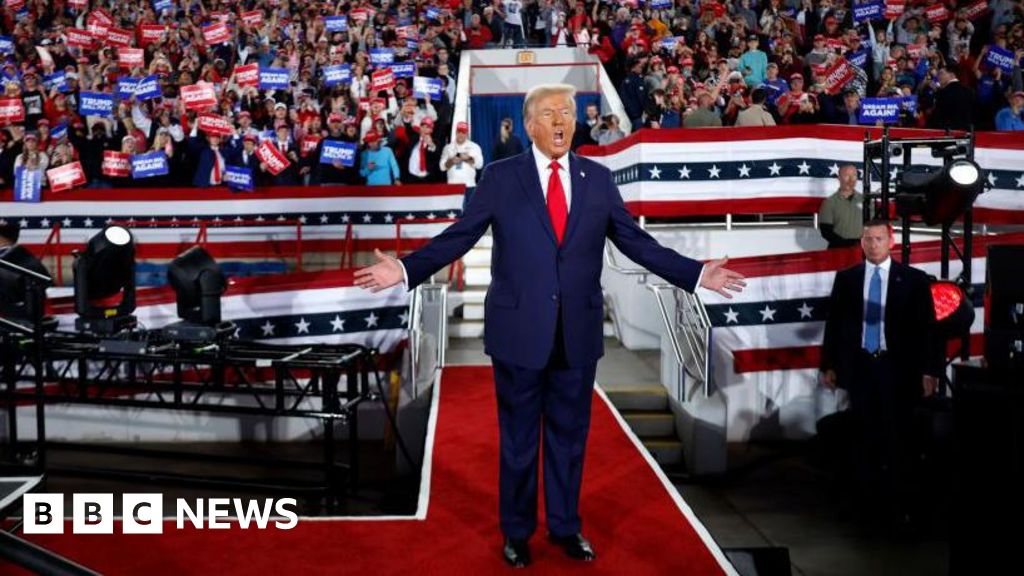
Donald Trump’s return to the White House will have a hugely negative effect on climate change action in the short-term but the longer term impact is less certain, experts say.
With world leaders meeting next week for the latest UN climate talks, COP29, the Trump victory will be seen as a huge roadblock to progress in both cutting emissions and raising cash for developing countries.
The US president-elect is a known climate sceptic who has called efforts to boost green energy a “scam”.
But with renewable energy gaining a strong foothold in the US and popular support for wind and solar, Trump’s efforts to ramp up oil and gas instead may be less effective.
While climate change did not play much of a role in this year’s campaign, Trump’s likely actions in office this time could be far more significant than in 2017.
Back then, he announced the US would pull out of the Paris climate agreement, the most important UN process to tackle climate change. The agreement saw almost all the world’s nations – for the first time – agree to cut the greenhouse gas emissions which cause global warming.
But the shock of Trump’s decision was limited. The treaty’s rules meant the US was not able to withdraw until November 2020, a few months before he left office.
If Trump withdraws again, he will only have to wait a year before the US is completely out. That would give him three years to chart his own course without any need to report to the UN or be bound by its rules.
While President Joe Biden’s negotiators will be at next week’s COP talks in Azerbaijan, nothing they agree to will be binding for the Trump administration.
“The US at this COP is not just a lame duck, it’s a dead duck,” said Prof Richard Klein, an expert on climate change policy for the Stockholm Environment Institute.
“They can’t commit to anything and that means that countries like China will not want to commit to anything.”
In recent years, richer countries such as the US, UK and EU states have tried to increase the funds available for developing countries to cope with climate change. But they also insist that big developing economies also contribute.
“The US basically wanted to have China cough up some money for that fund as well. Now they won’t be able to do that. That leaves China off the hook,” Prof Klein said.
Climate scientists say developing countries need billions of dollars of extra investment to become net zero, where they are not contributing to climate change, and stave off the effects of rising temperatures.
While the US might leave the Paris Agreement quite quickly, Trump would still be bound by other global efforts to fight climate change.
There have been reports that some of his supporters also want to turn their backs on these as well. Some have argued for a complete break from UN efforts on climate change, urging the president-elect to leave something called the UN Framework Convention on Climate Change, the treaty that underpins global collective action to tackle climate change.
This was ratified by the US Senate, almost unanimously, in 1992. Legal experts are unclear on the process of leaving the treaty, but any effort by the US to leave would be seen as a body blow to the principle of multi-lateral action to tackle the world’s greatest threat.
As well as these headline-grabbing international actions, the new Trump administration is likely to push for a major ramp up of oil and gas exploration within the US, roll back environmental protections as well as impose heavy tariffs on electric vehicles and solar panels coming from China.
“You are looking at, overall, a ‘drill baby drill’ philosophy,” Dan Eberhart, chief executive officer of oilfield services company Canary LLC told Bloomberg News.
“You are going to see offshore lease sales, you are going to see pipelines move much quicker, you are going to see fracking on federal lands and a mindset that is focused on lowering energy costs for consumers.”
There was a big drop in the share price of turbine manufacturers on Wednesday, as fears grew that US offshore wind farms would be cancelled by a Trump presidency.
But in the longer term, it is not clear if the new president will turn back the clock for coal, oil and gas, or curtail the growth of sustainable energy sources.
For a start he faces opposition – and notably from within his own party.
Biden’s Inflation Reduction Act, which may ultimately channel $1 trillion of spending into green energy, has been hugely beneficial to Republican districts.
According to one analysis, some 85% of the money has been in areas that elected Republicans.
With energy watchdog the International Energy Agency reporting that global investment in clean technology is running at double the size of coal, oil and gas in 2024, the new US administration might not want to drive this type of green investment into other, more eager countries.
Climate leaders are putting a lot of faith in the fact that the transition to green energy will not be derailed by the new Trump administration.
“The result from this election will be seen as a major blow to global climate action,” said Christiana Figueres, the former UN climate chief.
“But it cannot and will not halt the changes under way to decarbonise the economy and meet the goals of the Paris agreement.”
Science & Environment
2024 ‘virtually certain’ to be world’s warmest year on record
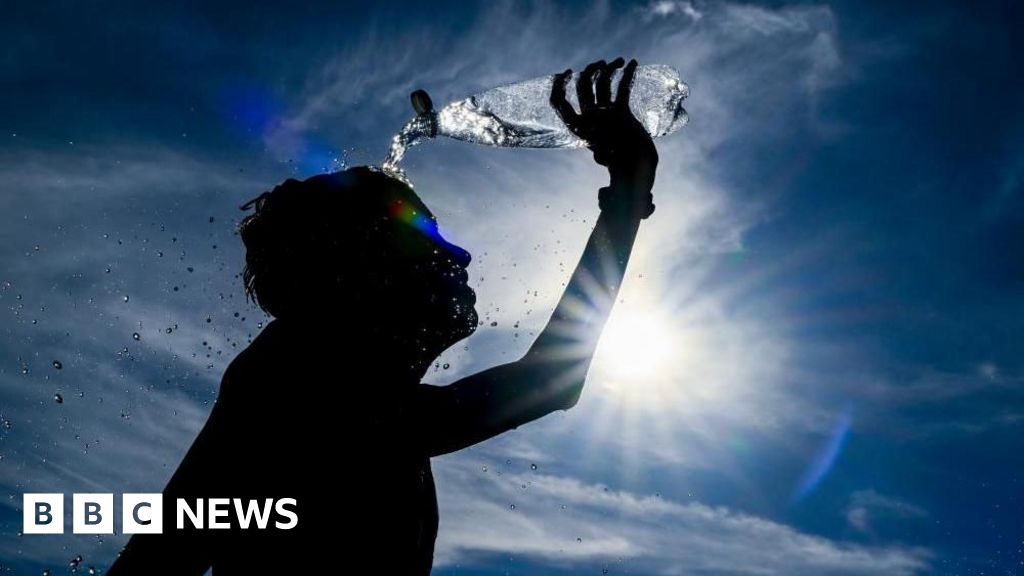
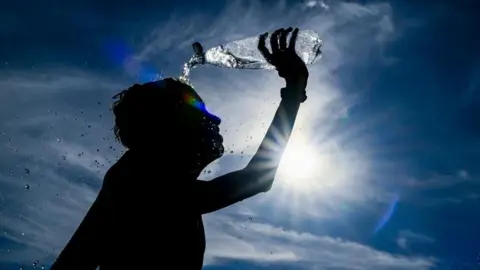 EPA
EPAIt is now “virtually certain” that 2024 – a year punctuated by intense heatwaves and deadly storms – will be the world’s warmest on record, according to projections by the European climate service.
Global average temperatures across the year are on track to end up more than 1.5C above pre-industrial levels, which would make 2024 the first calendar year to breach this symbolic mark.
These high temperatures are mainly down to human-caused climate change, with smaller contributions from natural factors such as the El Niño weather pattern.
Scientists say this should act as an alarm call ahead of next week’s UN climate conference in Azerbaijan, COP29.
“This latest record sends another stark warning to governments at COP29 of the urgent need for action to limit any further warming,” says Liz Bentley, chief executive of the Royal Meteorological Society.
Global temperatures have been so high through the first 10 months of 2024 that only an implausibly sharp drop in the final two months would prevent a new record from being set.
In fact, it is likely that 2024 will end up at least 1.55C hotter than pre-industrial times, according to data from the European Copernicus Climate Change Service.
“Pre-industrial” refers to the benchmark period of 1850-1900, which roughly equates to the time before humans started significantly heating up the planet, for example by burning large amounts of fossil fuels.
The projection means that 2024 could surpass the current record of 1.48C, which was set only last year.
“This marks a new milestone in global temperature records,” says Samantha Burgess, deputy director of Copernicus.
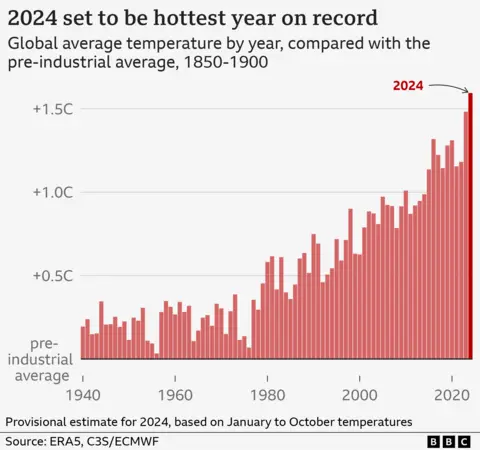
This would also represent the first time that a calendar year has passed 1.5C of warming, according to Copernicus data.
This would be symbolic, because almost 200 countries pledged to try to limit long-term temperature rises to that level under the Paris climate agreement in 2015, hoping to avoid some of the worst impacts of climate change.
If the 1.5C limit is breached, that does not mean the Paris goal has been broken, because it refers to average temperatures over a period of 20 years or so, in order to smooth out natural variability.
But every year-long breach brings the world closer to passing the 1.5C mark in the longer term. Last month, the UN warned that the world could warm by more than 3C this century based on current policies.
The specifics of 2024 also offer cause for concern.
Early 2024 warmth was boosted by the natural El Niño weather pattern. This is where surface waters in the east tropical Pacific Ocean are warmer than usual, which releases extra heat into the atmosphere.
This latest El Niño phase began in mid-2023 and ended around April 2024, but temperatures have remained stubbornly high since.
Over the past week, global average temperatures have set new records for the time of year every day, according to Copernicus data.
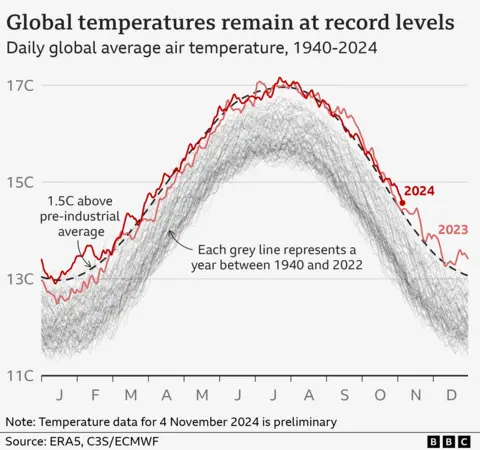
Many scientists expect the opposite, cooler phase, La Niña, to develop soon. This should, in theory, lead to a temporary drop in global temperatures next year, although exactly how this will play out is uncertain.
“We will watch with interest what happens going into 2025 and beyond,” says Ed Hawkins, professor of climate science at the University of Reading.
But, with levels of greenhouse gases in the atmosphere still rising quickly, scientists warn it is likely only a matter of time before new records are set.
“The warmer temperatures [are making] storms more intense, heatwaves hotter and heavy rainfall more extreme, with clearly seen consequences for people all around the world,” says Prof Hawkins.
“Stabilising global temperatures by reaching net zero emissions is the only way to stop adding to the costs of these disasters.”
Science & Environment
Prince William announces winners in Cape Town
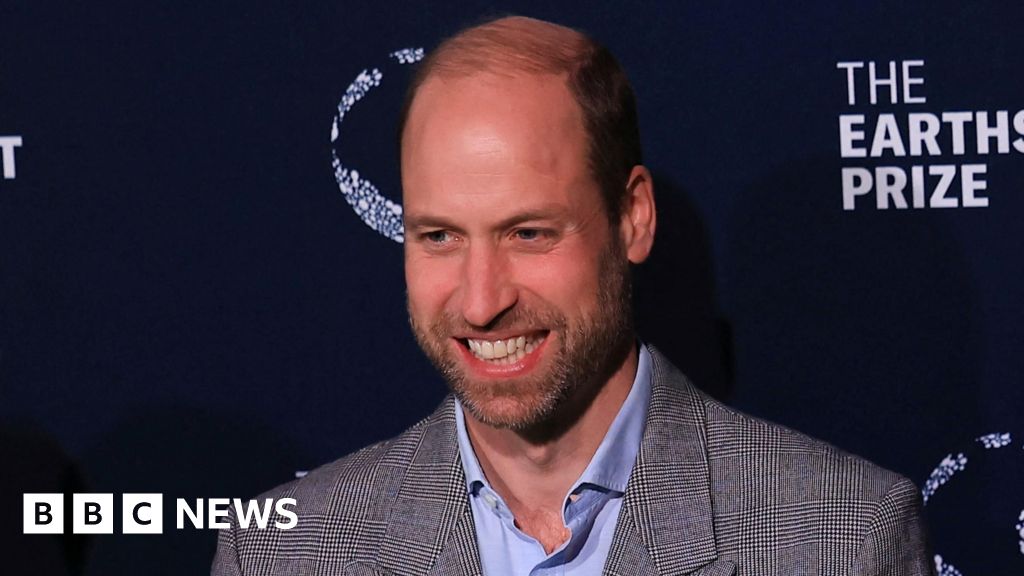
 PA
PAThe Prince of Wales has said he wants his environmental Earthshot prize to “change the world for good” over the next decade as he celebrated this year’s winners.
Prince William closed the awards ceremony in Cape Town by calling for people around the world to join the “movement for change”.
Models Heidi Klum and Winnie Harlow, actor Nina Dobrev and artist Tobe Nwigwe announced the £1m ($1.2m) prize winners from each category at the event.
The recipients included an initiative that saved a rare antelope species from extinction and a Kenyan company that uses solar powered fridges to stop harvested crops spoiling.
The fourth edition of the Prince’s annual Earthshot Prize awards was hosted by Emmy-winning actor Billy Porter and TV presenter Bonang Matheba.
It supports sustainable, eco-friendly projects from around the world, with each of the five winners receiving £1m to scale-up their innovative ideas to “repair” the planet.
There are five ‘Earthshots’ – or goals: Protect and Restore Nature; Clean Our Air; Revive Our Oceans; Build a Waste-free World; and Fix Our Climate.
Fifteen finalists, from countries including France, Kenya, Indonesia, the UK and Nepal, were competing for their category’s prize pot after being whittled down from 2,500 applicants.
Earthshot Prize 2024 – Full list of winners
- Clean Our Air: Green Africa Youth Organization, who use behavioural change to help communities clean up waste and build circular waste management infrastructure across Africa
- Build a Waste-free World: Keep IT Cool, a Kenyan-based company using solar powered refrigeration to help cut harvest waste for farmers
- Fix Our Climate: Advanced Thermovoltaic Systems, an American company that convert excess heat, produced during the making of steel or cement, into electricity
 PA
PAEarlier on Wednesday, the prince praised his wife the Princess of Wales, who is recovering after treatment for cancer, saying she has been “amazing this whole year”.
His wife had not travelled to South Africa and would watch the ceremony at home in Windsor, he said.
“I know she’ll be really keen to see tonight be a success,” he added.
All 2,000 attendees were asked to wear sustainable clothes – either made from recycled materials or a previously worn outfit – and on arrival a host of global stars, made their way down the “green carpet” instead of a traditional red one.
And the prince was no exception, dressed in a second-hand double-breasted Prince of Wales check jacket and white plastic-free fully biodegradable shoes.
Dubbed the prince’s “Super Bowl” moment, the awards were broadcast live across Africa and streamed online. In his closing remarks, the prince said he believed the world could be “rich in possibility, in hope, and in optimism”.
“Our aim was to find solutions to repair our planet and provide real hope for the future.
“We want to make this the decade in which we transform the world for good, one solution at a time, from the ground up,” he said.
 Getty Images
Getty ImagesWhen asked earlier about achieving the prize’s green goals in a tough political climate, the prince was positive.
“Everyone wants some hope and some optimism and Earthshot comes with urgent optimism,” he said.
Co-host Harlow said she was honoured to be involved in the project, adding: “This should be something near and dear to everyone’s heart when it comes to taking care of Mother Earth.”
And Klum, who announced the Fix Our Climate category winner, said: “It’s great to spread the word and shine a light on these amazing organisations and what they do.”
What is the Earthshot Prize?
 Getty Images
Getty ImagesOrganisers of the Earthshot Prize, which was first awarded in 2021, say they were inspired by former US president John F Kennedy’s Moonshot project, which set scientists the challenge of getting astronauts to the moon and back safely.
The aim of the awards, organisers say, is to celebrate and support those working to provide innovative solutions for climate and environmental issues.
There was a focus on ideas from Africa for this year’s Earthshot Prize, with more than 400 African-led projects nominated and another 350 linked to the continent.
Although Africa generates the fewest emissions for global warming, many of its countries are among the most vulnerable to climate change.
As he spoke of his deep connection to Africa last week, Prince William said he wanted this year’s prize to provide a platform for innovators to bring about change for their communities and inspire young people across the continent.
“Africa has always held a special place in my heart – as somewhere I found comfort as a teenager, and where I proposed to my wife,” he said.
Much of the prince’s visit to Cape Town has focused on young people and the power they have to bring about change.
“Without them the future is looking pretty bleak so these are the game-changers, the innovators, the inventors who are going to make the world a better place for us in future,” he said.
A recent UN report warned that the goals of the Paris agreement to keep global temperatures under 2C while making efforts to stay below 1.5C are now in very serious danger.
Science & Environment
Knots made in a weird quantum fluid can last forever


Certain knots, like this trefoil, can be formed from vortices in a quantum fluid
Login/Shutterstock
By manipulating a quantum fluid, researchers could form liquid knots that never unravel. These could help us shed light on odd quantum objects from the dawn of the universe.
When tiny whirlpools called vortices form in a fluid, they can make loops that can then be knotted like a loop of string. But while a string can form knots that won’t unravel without the help of scissors, knotted vortices in a fluid break free more easily. They can explode into a diffuse swarm of…
Science & Environment
Solar stocks that may suffer under Trump because of reliance on IRA, per Goldman
Science & Environment
Oil market’s future still uncertain under Donald Trump after election win
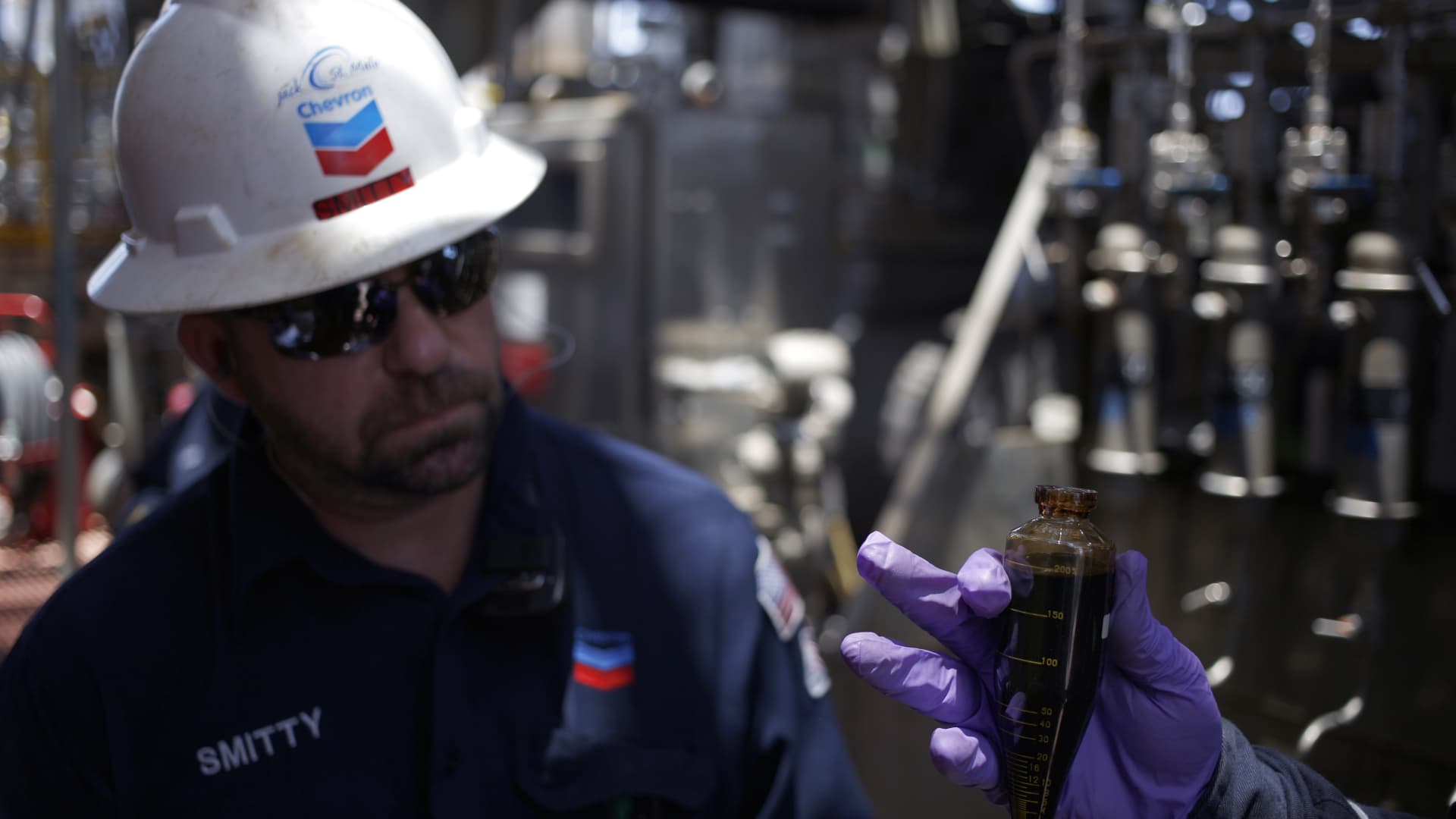
Offshore workers examine hydrocarbon samples aboard the Chevron Corp. Jack/St. Malo deepwater oil platform in the Gulf of Mexico off the coast of Louisiana, U.S., on Friday, May 18, 2018.
Luke Sharrett | Bloomberg | Getty Images
U.S. oil producers are looking forward to less regulations on crude production under a Donald Trump presidency, meaning higher oil supply and consequently lower prices.
But it’s not that straightforward: Trump who was announced Wednesday as the winner of the 2024 election, has also vowed to put more sanctions on Iranian and Venezuelan barrels, meaning the global market could become tighter, potentially boosting prices.
At the same time, the increased likelihood of trade wars under Trump could dampen global economic growth and slow oil demand. So the picture for the market’s longer-term outlook is, well, decidedly mixed.
“Conceptually, the impact of a potential second Trump term on oil prices is ambiguous, with some short-term downside risk to Iran oil supply … and thus upside price risk,” Goldman Sachs commodities analysts wrote in a research note Monday. “But medium-term downside risk to oil demand and thus oil prices from downside risk to global GDP from a potential escalation in trade tensions.”

Trump expressed his enthusiasm for increased U.S. oil production while giving a speech from the Republican campaign headquarters in Florida on Wednesday, just hours before his victory was confirmed. He made a reference to Robert F. Kennedy, Jr., the independent candidate who he said would become a part of his team.
“Bobby, stay away from the oil, stay away from the liquid gold!” Trump said in a joking tone. “We have more than Saudi Arabia and Russia.” Kennedy is known for his history of environmental activism.
U.S. oil and gas production hit record highs under the Biden administration, which gradually changed its approach to the industry despite campaigning on pledges of environmental stewardship.
U.S. crude futures — both West Texas Intermediate and international benchmark Brent crude — are currently trading in the $70 to $75 per barrel range, which is lower than what many oil producers seek to balance their costs and budgets amid slowed global demand for oil and growing supply.

But a further push to open drilling projects, putting more supply on the market, would lead to lower prices, thereby decreasing revenues for American producers, said Cole Smead, president and CEO of Smead Capital.
“If the Trump administration opens up federal leases for oil and gas, Federal lands would get 25% per barrel of revenues. You will have a lot of trouble finding an oil company that can make money at $52.50 per barrel with what they have left from a $70 barrel,” Smead said in emailed notes. “The only thing that will cause drill baby drill to happen is higher oil prices based on these margins.”
“Drill baby, drill is going to run into the energy vigilantes,” he added. “Now that equity investors in the energy business know what free cash flow looks like they won’t give it up. They will allow capital expenditures to go up over their dead body.”
‘Clear competitive advantage’
The U.S. is the world’s largest oil producer, accounting for 22% of the global total, according to the Energy Information Administration, with Saudi Arabia next, producing 11%. The vast majority of U.S. crude is consumed within the country, which is also the world’s largest oil consumer.
The CEO of French oil major TotalEnergies told CNBC over the weekend that whoever wins the presidency should ensure that the U.S. doesn’t lose its energy advantage.
“U.S. energy has been unleashed … since the last two, three years, production of oil has never been so high,” in the country, Patrick Pouyanne told CNBC in Abu Dhabi.
“For me, today, the U.S. has a clear competitive advantage on energy compared to many [in the] rest of the world,” he said. “So I will be surprised to see whoever is elected lose the competitive advantage.”

Many in the market forecast lower crude prices due to Trump’s encouragement of domestic oil production and greater supply. Amrita Sen, founder and director of research at London-based Energy Aspects, sees it differently due to the specter of sanctions.
“Every hedge fund I’ve spoken to thinks bearish, because [Trump has] tended to tweet about low oil prices … I actually think it’s the opposite,” she said. “There’s an enormous amount of sanctioned barrels right now in the market, especially Iranian volumes.” Iran is currently producing 3.5 million barrels per day of crude or more, Sen said, with 1.8 million of those being exported, as sanctions and their enforcement loosened under the Biden administration.
“You could lose a million barrels per day of that … when Trump was in power, Iranian exports were just 400,000 barrels per day,” Sen said. “Now I’m not saying it’s going to go down all the way, because smuggling networks are bigger and better probably now, but you could lose a million there,” she said, adding that some Venezuelan barrels could go off the market as well.
For Smead, the outlook is bearish, as he predicts lower prices putting many producers — particularly those with higher production costs — in a less-than-ideal situation.
“The price of goods that are produced is the number one factor in America’s policies,” he said. “If you are not the low-cost producer, you should be scared.”
Science & Environment
Trump’s election victory sparks dismay among climate community
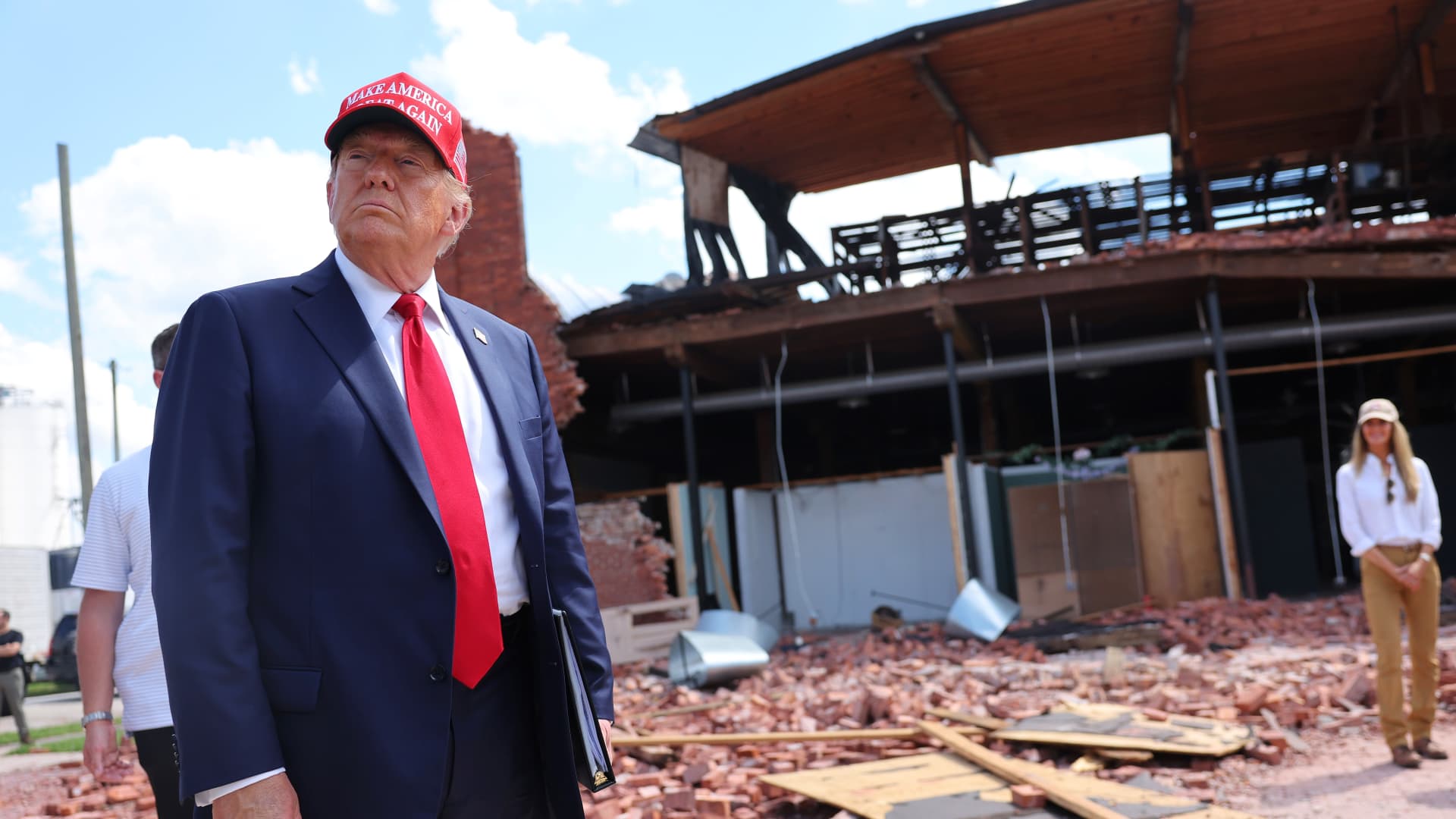
Republican presidential nominee, former U.S. President Donald Trump, listens to a question as he visits Chez What Furniture Store which was damaged during Hurricane Helene on September 30, 2024 in Valdosta, Georgia.
Michael M. Santiago | Getty Images News | Getty Images
Donald Trump’s election victory on Wednesday sparked a palpable sense of dismay among the climate community, with two key architects of the landmark Paris Agreement warning that the result will make it harder to slash planet-heating greenhouse gas emissions.
Trump will defeat his Democratic rival Kamala Harris and return to the White House for a second four-year term, according to an NBC News projection.
It marks a historic and somewhat improbable comeback for one of the most polarizing figures in modern American politics.
The 78-year-old, who has called the climate crisis “one of the great scams,” has pledged to ramp-up fossil fuel production, pare back outgoing President Joe Biden’s emissions-limiting regulations and pull the country out of the Paris climate accord — again.
The 2015 Paris Agreement is a critically important framework designed to reduce global greenhouse gas emissions. It aims to “limit global warming to well below 2, preferably to 1.5 degrees Celsius, compared to pre-industrial levels” over the long term.
Laurence Tubiana, a key architect of the Paris Agreement, said Trump’s election victory “is a setback for global climate action, but the Paris Agreement has proven resilient and is stronger than any single country’s policies.”
Tubiana, a French economist and diplomat who now serves as CEO of the European Climate Foundation, said the context today is “very different” to Trump’s first election victory in 2016.
French Economist Dr. Laurence Tubiana speaks during an event ‘G-20 Event: New Challenges in International Taxation’ at the annual meetings of the International Monetary Fund (IMF) and World Bank in Washington DC, United States on April 17, 2024.
Anadolu | Anadolu | Getty Images
“There is powerful economic momentum behind the global transition, which the US has led and gained from, but now risks forfeiting. The devastating toll of recent hurricanes was a grim reminder that all Americans are affected by worsening climate change,” Tubiana said.
“Responding to the demands of their citizens, cities and states across the US are taking bold action,” she added.
“Europe now has the responsibility and opportunity to step up and lead. By pushing forward with a fair and balanced transition, in close partnership with others, it can show that ambitious climate action protects people, strengthens economies, and builds resilience.”
‘An antidote to doom and despair’
Separately, Christiana Figueres, the former United Nations climate chief who oversaw the 2015 Paris summit, said the U.S. election result will be regarded as a “major blow to global climate action.”
However, Figueres said “it cannot and will not halt the changes underway to decarbonise the economy and meet the goals of the Paris Agreement.”
“Standing with oil and gas is the same as falling behind in a fast moving world,” she continued, predicting that clean energy technologies would continue to outcompete fossil fuels over the coming years.
Dame Christiana Figueres, Chair, The Earthshot Prize speaks at the Earthshot Prize Innovation Summit in partnership with Bloomberg Philanthropies on September 24, 2024 in New York City.
Bryan Bedder | Getty Images Entertainment | Getty Images
“Meanwhile, the vital work happening in communities everywhere to regenerate our planet and societies will continue, imbued with a new, even more determined spirit today,” Figueres said.
“Being here in South Africa for the Earthshot Prize makes clear that there is an antidote to doom and despair. It’s action on the ground, and it’s happening in all corners of the Earth.”
-

 Science & Environment2 months ago
Science & Environment2 months agoHow to unsnarl a tangle of threads, according to physics
-

 Technology1 month ago
Technology1 month agoIs sharing your smartphone PIN part of a healthy relationship?
-

 Science & Environment2 months ago
Science & Environment2 months agoHyperelastic gel is one of the stretchiest materials known to science
-

 Science & Environment2 months ago
Science & Environment2 months ago‘Running of the bulls’ festival crowds move like charged particles
-

 Technology2 months ago
Technology2 months agoWould-be reality TV contestants ‘not looking real’
-

 Science & Environment1 month ago
Science & Environment1 month agoX-rays reveal half-billion-year-old insect ancestor
-

 Science & Environment2 months ago
Science & Environment2 months agoPhysicists have worked out how to melt any material
-

 Science & Environment2 months ago
Science & Environment2 months agoMaxwell’s demon charges quantum batteries inside of a quantum computer
-

 Money1 month ago
Money1 month agoWetherspoons issues update on closures – see the full list of five still at risk and 26 gone for good
-

 Sport1 month ago
Sport1 month agoAaron Ramsdale: Southampton goalkeeper left Arsenal for more game time
-

 Science & Environment2 months ago
Science & Environment2 months agoSunlight-trapping device can generate temperatures over 1000°C
-

 MMA1 month ago
MMA1 month ago‘Dirt decision’: Conor McGregor, pros react to Jose Aldo’s razor-thin loss at UFC 307
-

 News1 month ago
News1 month agoWoman who died of cancer ‘was misdiagnosed on phone call with GP’
-

 Football1 month ago
Football1 month agoRangers & Celtic ready for first SWPL derby showdown
-

 Technology1 month ago
Technology1 month agoUkraine is using AI to manage the removal of Russian landmines
-

 Technology1 month ago
Technology1 month agoGmail gets redesigned summary cards with more data & features
-
Business1 month ago
how UniCredit built its Commerzbank stake
-

 News1 month ago
News1 month ago‘Blacks for Trump’ and Pennsylvania progressives play for undecided voters
-

 Science & Environment2 months ago
Science & Environment2 months agoLaser helps turn an electron into a coil of mass and charge
-

 Science & Environment2 months ago
Science & Environment2 months agoA new kind of experiment at the Large Hadron Collider could unravel quantum reality
-

 Sport1 month ago
Sport1 month agoBoxing: World champion Nick Ball set for Liverpool homecoming against Ronny Rios
-

 Technology1 month ago
Technology1 month agoEpic Games CEO Tim Sweeney renews blast at ‘gatekeeper’ platform owners
-

 Technology1 month ago
Technology1 month agoSamsung Passkeys will work with Samsung’s smart home devices
-

 Science & Environment2 months ago
Science & Environment2 months agoLiquid crystals could improve quantum communication devices
-

 Technology1 month ago
Technology1 month agoRussia is building ground-based kamikaze robots out of old hoverboards
-

 Science & Environment2 months ago
Science & Environment2 months agoWhy this is a golden age for life to thrive across the universe
-

 Science & Environment2 months ago
Science & Environment2 months agoQuantum ‘supersolid’ matter stirred using magnets
-

 MMA1 month ago
MMA1 month agoDana White’s Contender Series 74 recap, analysis, winner grades
-

 News1 month ago
News1 month agoNavigating the News Void: Opportunities for Revitalization
-

 Sport1 month ago
Sport1 month ago2024 ICC Women’s T20 World Cup: Pakistan beat Sri Lanka
-

 Entertainment1 month ago
Entertainment1 month agoBruce Springsteen endorses Harris, calls Trump “most dangerous candidate for president in my lifetime”
-

 Technology1 month ago
Technology1 month agoMicrosoft just dropped Drasi, and it could change how we handle big data
-

 News1 month ago
News1 month agoMassive blasts in Beirut after renewed Israeli air strikes
-

 MMA1 month ago
MMA1 month ago‘Uncrowned queen’ Kayla Harrison tastes blood, wants UFC title run
-

 MMA1 month ago
MMA1 month agoPereira vs. Rountree prediction: Champ chases legend status
-

 Technology1 month ago
Technology1 month agoCheck, Remote, and Gusto discuss the future of work at Disrupt 2024
-

 News1 month ago
News1 month agoRwanda restricts funeral sizes following outbreak
-

 Technology1 month ago
Technology1 month agoMicrophone made of atom-thick graphene could be used in smartphones
-
Business1 month ago
Top shale boss says US ‘unusually vulnerable’ to Middle East oil shock
-

 TV1 month ago
TV1 month agoসারাদেশে দিনব্যাপী বৃষ্টির পূর্বাভাস; সমুদ্রবন্দরে ৩ নম্বর সংকেত | Weather Today | Jamuna TV
-

 Business1 month ago
Business1 month agoWater companies ‘failing to address customers’ concerns’
-

 Sport1 month ago
Sport1 month agoWXV1: Canada 21-8 Ireland – Hosts make it two wins from two
-

 News1 month ago
News1 month agoCornell is about to deport a student over Palestine activism
-

 Business1 month ago
Business1 month agoWhen to tip and when not to tip
-

 Science & Environment2 months ago
Science & Environment2 months agoQuantum forces used to automatically assemble tiny device
-

 Technology1 month ago
Technology1 month agoWhy Machines Learn: A clever primer makes sense of what makes AI possible
-

 News2 months ago
News2 months ago▶️ Hamas in the West Bank: Rising Support and Deadly Attacks You Might Not Know About
-

 Technology1 month ago
Technology1 month agoSingleStore’s BryteFlow acquisition targets data integration
-

 News1 month ago
News1 month agoHull KR 10-8 Warrington Wolves – Robins reach first Super League Grand Final
-

 Science & Environment2 months ago
Science & Environment2 months agoITER: Is the world’s biggest fusion experiment dead after new delay to 2035?
-

 Technology2 months ago
Technology2 months agoMeta has a major opportunity to win the AI hardware race
-

 Science & Environment2 months ago
Science & Environment2 months agoA slight curve helps rocks make the biggest splash
-

 MMA1 month ago
MMA1 month agoKayla Harrison gets involved in nasty war of words with Julianna Pena and Ketlen Vieira
-

 Football1 month ago
Football1 month ago'Rangers outclassed and outplayed as Hearts stop rot'
-

 Technology1 month ago
Technology1 month agoLG C4 OLED smart TVs hit record-low prices ahead of Prime Day
-

 News1 month ago
News1 month ago▶ Hamas Spent $1B on Tunnels Instead of Investing in a Future for Gaza’s People
-

 Sport1 month ago
Sport1 month agoShanghai Masters: Jannik Sinner and Carlos Alcaraz win openers
-

 Science & Environment2 months ago
Science & Environment2 months agoNuclear fusion experiment overcomes two key operating hurdles
-

 Sport1 month ago
Sport1 month agoChina Open: Carlos Alcaraz recovers to beat Jannik Sinner in dramatic final
-

 Football1 month ago
Football1 month agoWhy does Prince William support Aston Villa?
-

 MMA1 month ago
MMA1 month agoPennington vs. Peña pick: Can ex-champ recapture title?
-

 Sport1 month ago
Sport1 month agoPremiership Women’s Rugby: Exeter Chiefs boss unhappy with WXV clash
-

 Money4 weeks ago
Money4 weeks agoTiny clue on edge of £1 coin that makes it worth 2500 times its face value – do you have one lurking in your change?
-

 Technology1 month ago
Technology1 month agoMusk faces SEC questions over X takeover
-

 Sport1 month ago
Sport1 month agoCoco Gauff stages superb comeback to reach China Open final
-

 Womens Workouts1 month ago
Womens Workouts1 month ago3 Day Full Body Women’s Dumbbell Only Workout
-

 Technology1 month ago
Technology1 month agoUniversity examiners fail to spot ChatGPT answers in real-world test
-
Business1 month ago
Bank of England warns of ‘future stress’ from hedge fund bets against US Treasuries
-
Travel1 month ago
World of Hyatt welcomes iconic lifestyle brand in latest partnership
-

 Sport1 month ago
Sport1 month agoSturm Graz: How Austrians ended Red Bull’s title dominance
-

 MMA1 month ago
MMA1 month ago‘I was fighting on automatic pilot’ at UFC 306
-

 TV1 month ago
TV1 month agoTV Patrol Express September 26, 2024
-

 News1 month ago
News1 month agoGerman Car Company Declares Bankruptcy – 200 Employees Lose Their Jobs
-

 Sport1 month ago
Sport1 month agoWales fall to second loss of WXV against Italy
-

 Science & Environment2 months ago
Science & Environment2 months agoTime travel sci-fi novel is a rip-roaringly good thought experiment
-

 Science & Environment2 months ago
Science & Environment2 months agoNerve fibres in the brain could generate quantum entanglement
-

 MMA1 month ago
MMA1 month agoHow to watch Salt Lake City title fights, lineup, odds, more
-
Business1 month ago
DoJ accuses Donald Trump of ‘private criminal effort’ to overturn 2020 election
-
Business1 month ago
Sterling slides after Bailey says BoE could be ‘a bit more aggressive’ on rates
-

 Sport1 month ago
Sport1 month agoURC: Munster 23-0 Ospreys – hosts enjoy second win of season
-

 Sport1 month ago
Sport1 month agoNew Zealand v England in WXV: Black Ferns not ‘invincible’ before game
-

 Technology1 month ago
Technology1 month agoJ.B. Hunt and UP.Labs launch venture lab to build logistics startups
-

 Technology1 month ago
Technology1 month agoAmazon’s Ring just doubled the price of its alarm monitoring service for grandfathered customers
-

 Technology1 month ago
Technology1 month agoQuoroom acquires Investory to scale up its capital-raising platform for startups
-
Business1 month ago
Italy seeks to raise more windfall taxes from companies
-
Business1 month ago
The search for Japan’s ‘lost’ art
-

 MMA1 month ago
MMA1 month agoKetlen Vieira vs. Kayla Harrison pick, start time, odds: UFC 307
-

 Technology1 month ago
Technology1 month agoThe best shows on Max (formerly HBO Max) right now
-

 Technology1 month ago
Technology1 month agoIf you’ve ever considered smart glasses, this Amazon deal is for you
-

 News2 months ago
News2 months ago▶️ Media Bias: How They Spin Attack on Hezbollah and Ignore the Reality
-

 Science & Environment2 months ago
Science & Environment2 months agoHow to wrap your mind around the real multiverse
-
Business1 month ago
‘Let’s be more normal’ — and rival Tory strategies
-
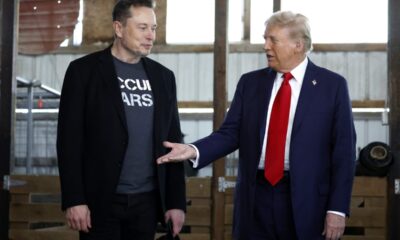
 News1 month ago
News1 month agoTrump returns to Pennsylvania for rally at site of assassination attempt
-

 MMA1 month ago
MMA1 month agoKevin Holland suffers injury vs. Roman Dolidze
-

 Sport1 month ago
Sport1 month agoMan City ask for Premier League season to be DELAYED as Pep Guardiola escalates fixture pile-up row
-

 MMA1 month ago
MMA1 month agoUFC 307’s Ketlen Vieira says Kayla Harrison ‘has not proven herself’
-

 News1 month ago
News1 month agoHarry vs Sun publisher: ‘Two obdurate but well-resourced armies’
-

 Technology4 weeks ago
Technology4 weeks agoThe FBI secretly created an Ethereum token to investigate crypto fraud
-

 Technology4 weeks ago
Technology4 weeks agoNintendo’s latest hardware is not the Switch 2
-

 Science & Environment2 months ago
Science & Environment2 months agoA tale of two mysteries: ghostly neutrinos and the proton decay puzzle



You must be logged in to post a comment Login